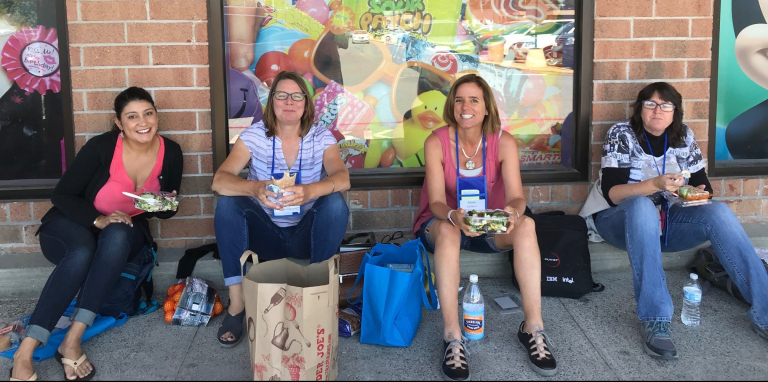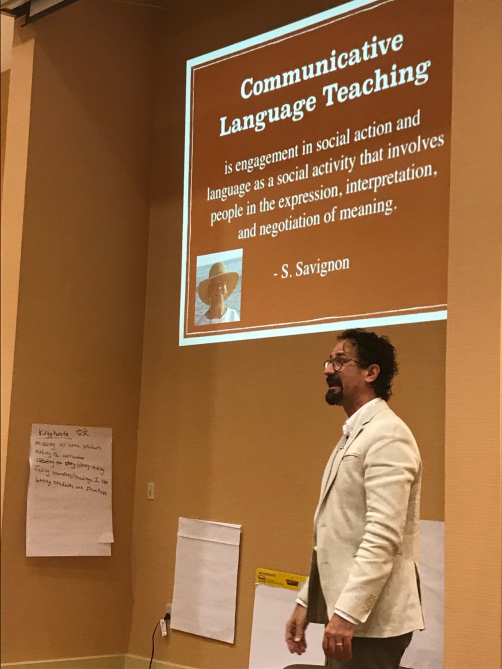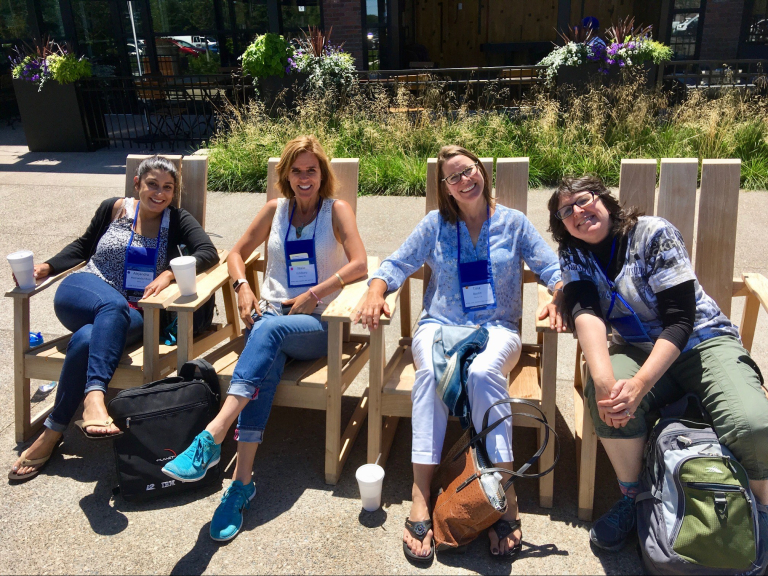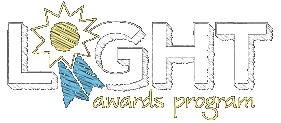Guest blog by the teachers at Davis Joint Unified School District, current grantees of the LIGHT Awards project Bringing World Languages Alive in Davis Joint Unified.

Thanks to the awesome Light Awards grant that we received, we have been able to spend the first year of our grant focusing on CI (Comprehensible Input) in both Spanish Immersion classes and traditional Spanish classes. If it were not for this grant, we would still be following the scope and sequence of a grammar book, teaching vocabulary lists and having students fill out verb charts. What adult says: “I’m going to speak to my daughter in present tense until she’s 6, then I’ll throw in past”? This grant allows us to design our own professional development that best meets the needs of language learners. Our hope is that we can produce highly proficient second (and third or fourth!) language speakers that want to continue in languages!
If we had a dollar for every time we heard our educational leaders say “We need to prepare our students for the 21st century” or “We need to teach them 21st century skills” we could (but wouldn’t!) retire tomorrow. Understanding languages and cultures is paramount to preparing our students for 21st century skills. Superintendent Torlakson’s Global California 2030 initiative talks about increasing the number of world languages offered and increasing the number of students proficient in more than one language over the next 12 years. There is not a 21st century skill more important than being able to communicate with people outside of our geographical, political and religious bubble. Learning a second language, or becoming PROFICIENT in a second language, does just that. Students are not only learning in and about the language, but they are also learning about culture, perspective and traditions. With all of this knowledge and all this rhetoric about “preparing our students for the 21st century”, why are languages often overlooked for funding for professional development? It is only logical that teachers are trained in research-based strategies and are provided with tools that allow students to become as proficient as possible. The LIGHT Awards grant has allowed us to do all this and more! This last year we have been able :
- Receive a 2-3 day training with TPRS.
- Have TPRS consultant and expert, Scott Benedict, come out and work with a group of teachers for two days.
- Visit schools in Roseville that have gone completely C.I. in their language departments. A huge shout out to the following teachers for opening up your classrooms to us: Scott Benedict, Barbara Rachman and Laurie Clarcq at T. Eich Middle School. A few months later, we went to Oakmont High in Roseville where we observed CI at the High School level, from Spanish 1 to Spanish 4 and French 4. We loved watching Grant Adams’ Spanish 1 class where he made every minute count! The students transitioned from one CI activity to the next and we were so impressed with their use of the target language. That was a very engaged class! Clarice Swaney fully captivated her class with the word “Rechazar” (it was a word in an upcoming novel). The students watched engaging video clips of people being rejected (the English word for rechazar) and talked about how that would make them feel. We heard the students using all tenses and moods of the verb within that period. Lastly, we observed Mamadou Balde teach a higher-level French class. The students read and interpreted a French song. The students were so connected to that song that a few tears were shed when a couple of girls talked about how it made them feel.
- Were able to purchase over $4000 in TPRS novels! I have been teaching Spanish for 24 years and I have NEVER seen so many students actually reading during the Free Volunteer Reading period. These books are not just comprehensible but intriguing and of high interest! There are themes of historical injustices, adventure, political situations, and many are culturally rich that teach the readers about other countries in a compelling way. Below are pictures of what our grant bought for one of our classrooms. The second picture is what it looks like to give comprehensible and compelling novels to a 9th grade class, during the last weeks of school! Thank you, TPRS authors!


- And, lastly, we were able to conclude the first year of our grant by going to the National TPRS conference in Boston, MA. It is a language teacher’s summer camp! We all felt a little star-struck when we saw superstars Bill Vanpatten, Martina Bex, Karen Rowan and Sr. Jordan upfront and personal! We have been reading about these people and following them online for this entire year. We also got the opportunity to see and talk to Blaine Ray, which is always a delight. He is so genuine and his love for languages, teaching and people shines through in everything he says. We were in workshops and trainings for 5 days straight. Our minds were exploding with so much information and ideas that we made it a ritual to decompress by enjoying a drink after the last workshop of the day. Besides all the learning, we really loved meeting with teachers just like us; teachers across the world that are passionate about teaching languages and passing that passion on to their students.
Aha moments from NTPRS
- “Grade the comprehension and celebrate the production!” Jason Fritz

We could listen to Jason Fritze all day. He is so knowledgeable and so funny!
- Bill VanPatten suggests how we can initiate change: “Educate ourselves and educate the profession about language, communication, and the nature of acquisition.“
- “If you take care of the input, the output takes care of itself.” – Jason Fritze
- “A compelling story prompts your pituitary gland to produce oxytocin, calling you to action. Stories connect us to other people.” Martina Bex
- “Teach the verb “pensar” early. This allows us to create anticipation and also allows them express their opinions as soon as they are ready.” Jason Fritze
- “Heritage students need a literacy class. Kick them out of Spanish 1. It’s like having calculus students in math basics. If at all possible, establish a heritage program.” – Craig Sheehy
And the following aha moments do not have owners! If you know the person that said these, let us know so we can credit them!
- “Language learning is for life”
- “They’re just words”
- “Grammar lasts for 3 months, songs last forever”
- “Grammar is an editing tool but will never make you fluent”
- “Listening in Spanish makes you a better speaker, reading in Spanish makes you a better writer”
- “Don’t repeat, just listen!!!” (there is a silent period)
- “Proficiency and grammatical accuracy are not synonymous”
- “Life would seem a bit less meaningful if we didn’t share stories with one another”
- “The human brain is hardwired to think in story terms”
- “No book is too easy”
- You don’t say “I’m going to speak to my daughter in present tense until she’s 6, then I’ll throw in past”. Why would we do that with L2 learners?! It’s unnatural
Apart from all the professional development this grant has given us, our time spent with each other has been the most valuable. As teachers, we never have time to meet with one another without a scripted agenda that we must follow. Our grant provides time for us each month to meet over dinner! What teachers ever get to do that? Time spent with our peers is so key to being a successful teacher and we have finally been given the means to do this. This time has been invaluable for the strength of our team and talking to one another gives us a better understanding of how to help each other.
Like the NTPRS website said, this conference was like a summer camp for teachers. We appreciated the time to talk with colleagues and new acquaintances about their experiences and ideas. We got tips, encouragement and also a boost in confidence that made us feel like we were on the right track and doing a good job as teachers. It was also interesting to find out what other school districts do and how they support their world language teachers. A common question we asked was “Who supported/paid for you to come here?” Our anecdotal analysis says that about 90% of teachers said that their districts paid for them and the other 10% said they either paid themselves or found others funds to help them. All in all, we felt the love and encouragement from our colleagues around the world at this conference. In our eyes, all teachers are superstars!
Looking forward to the second and final year of our grant: All teachers on our grant team will be trained in the ACTFL oral proficiency assessment MOPI. In addition, we will have training in the WPT, the ACTFL writing proficiency assessment. For years the Spanish immersion master plan committee has talked about finding an oral proficiency assessment that is aligned to ACTFL and not only have we never had funding but there was no evidence of us ever having funding to be trained in evaluating their language proficiency in an internationally agreed upon assessment. On August 22-24, Alice Miano, from Stanford University, came out and trained our team and six other teachers. Our goal is to get a good representation of teachers throughout our district to be trained so that we can share common language when we talk about proficiency, instead of basing it on a specific level in a textbook.

Can’t go back east without sitting in Adirondack chairs!
